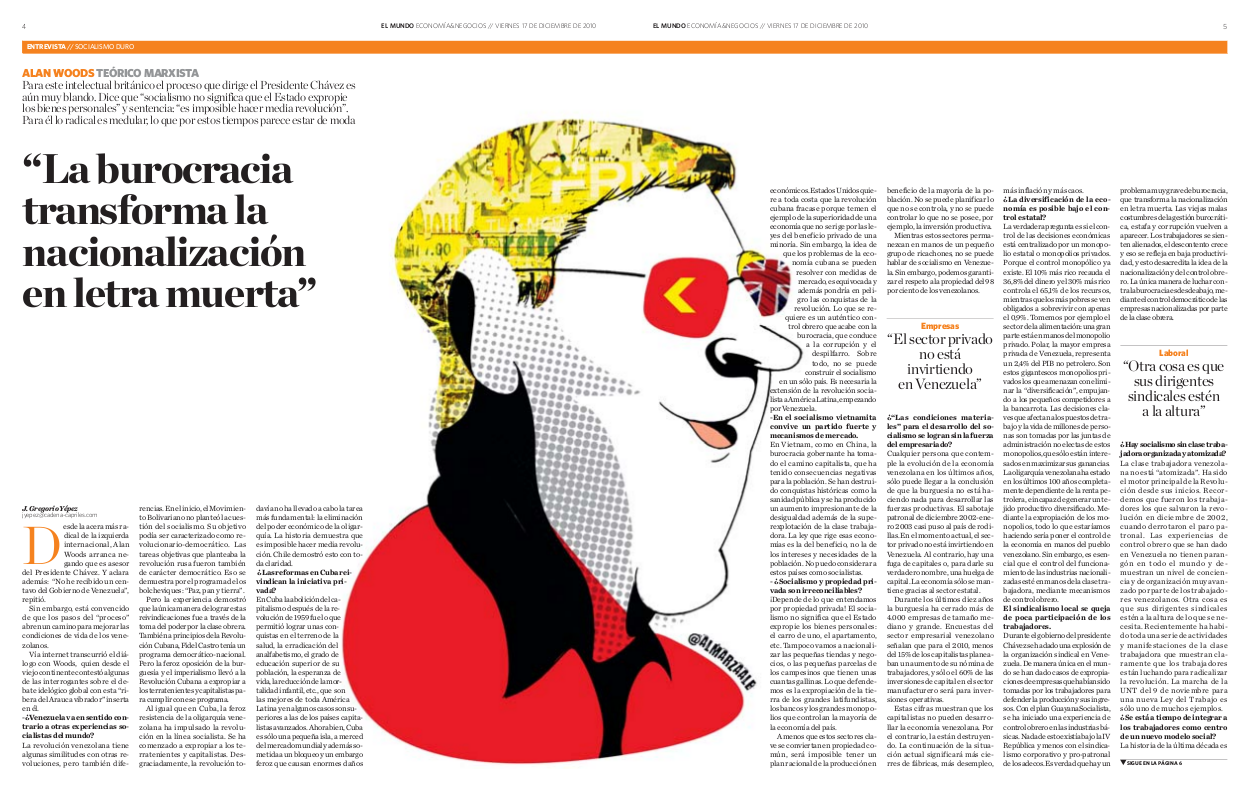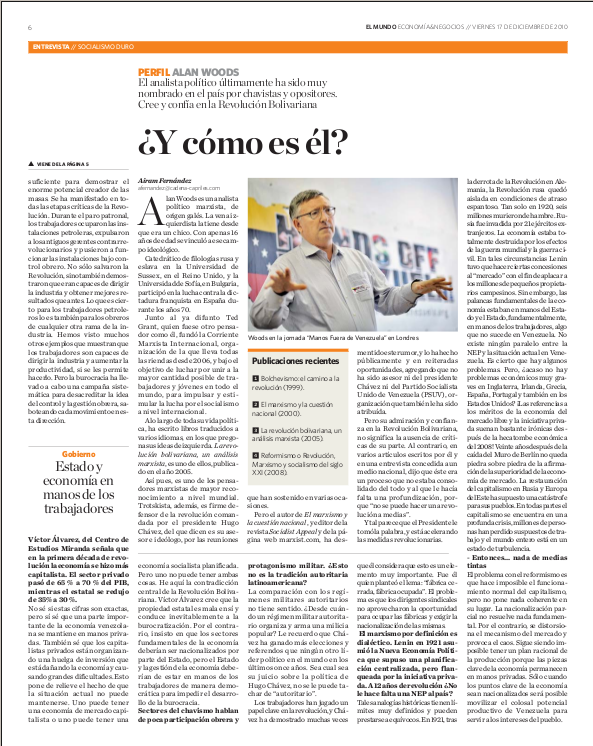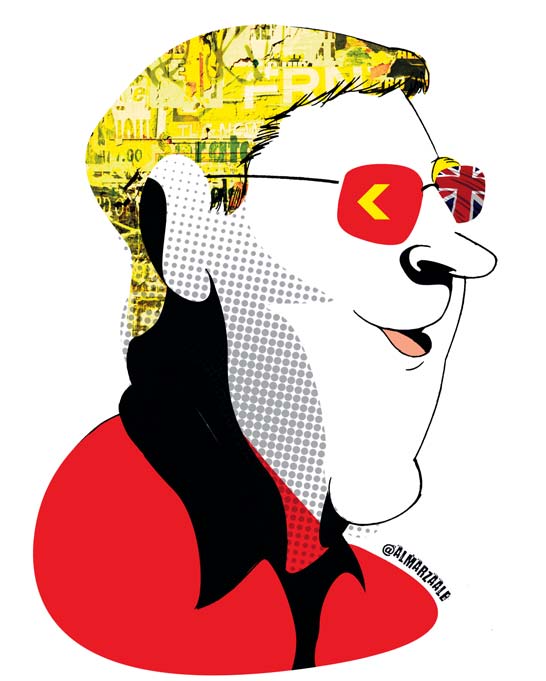The prestigious Venezuelan economic daily El Mundo recently asked Alan Woods to answer a questionnaire that raises some of the fundamental questions of the Venezuelan Revolution, including the economy and the question of property, the role of the working class and the bourgeoisie. We publish the English translation of the interview, which was published on 17 December.
From the most radical wing of the international left, Alan Woods starts by denying that he is an advisor to President Chavez. And he further clarifies: "I have never received a cent from the Venezuelan government", he repeated.
However, he is convinced that the steps taken by the "process" open the way for an improvement of the living conditions of the Venezuelans.
The dialogue with Woods took place via internet. From the old continent he answered some of the questions about the global ideological debate with this "shore of the vibrant Arauca" as part of it.
Q: Is Venezuela running counter to other socialist experiences that have taken place earlier in the world?
The Venezuelan revolution has some similarities with other revolutions, but also dissimilarities. In the beginning, the Bolivarian Movement did not raise the question of socialism. Its aims could be described as revolutionary-democratic. The objective tasks posed by the Russian Revolution were also of a democratic character. That is shown by the programme of the Bolsheviks: "Peace, Bread and Land".
However, experience proved that the only way to achieve these demands was through the assumption of power by the working class. In Cuba, at the beginning of the Revolution, Fidel Castro also had a bourgeois-democratic programme. But the ferocious opposition of the bourgeoisie and imperialism impelled the Cuban Revolution to expropriate the landlords and capitalists in order to carry out its programme.
As in Cuba, the ferocious resistance of the Venezuelan oligarchy has impelled the Revolution onto socialist lines. It has begun to expropriate the landlords and capitalists. Unfortunately, the revolution has not yet carried out the most fundamental task: the elimination of the economic power of the oligarchy. History shows that it is impossible to make half a revolution. Chile showed that very clearly.
Q: Don’t the recent reforms in Cuba vindicate private enterprise?
AW: The abolition of capitalism after the revolution of 1959 was what allowed Cuba to achieve big gains in the field of health, the eradication of illiteracy, raising the educational level of its population and life expectancy, reducing infant mortality rates, etc. which are the best results in Latin America and in some cases are superior to those of the advanced capitalist countries.
However, Cuba is only a small island at the mercy of the global market and moreover has been subjected to a ferocious blockade that has caused enormous economic damage. The U.S.A wants the Cuban Revolution to fail at all costs because they fear the example of the superiority of an economy that is not governed by the laws of profit for a minority.
However, the idea that Cuba’s economic problems can be solved by promoting the private sector is a very serious mistake and one that can seriously jeopardize the future of the revolution. The only way to put an end to bureaucracy, which leads to corruption and waste, is real workers’ control. Above all, it is impossible to build socialism in one country. What is needed is the extension of the socialist revolution to Latin America, starting with Venezuela.
Q: In Vietnamese Socialism a strong party co-exists with market mechanisms.
AW: In Vietnam, as in China, the ruling bureaucracy has taken the capitalist road, which has had negative consequences for the population. Historic achievements, such as public health, have been destroyed and there has been a dramatic increase in inequality in addition to the overexploitation of the working class. The law governing these economies is that of profit, not the interests and needs of the population. I cannot consider these countries as socialist.
Are socialism and private property incompatible?
That depends what you mean by private property! Socialism does not mean that the state will take your personal property: your car, your flat, etc. This property will not be touched. Nor is it necessary to nationalize small shops and businesses, or the small plots of the peasant who keeps a few chickens. What we advocate is the expropriation of the estates of the big landowners, the banks and big monopolies that control the bulk of the economy of the nation.
Unless these key sectors are converted into common property, it will be impossible to have a rational plan of production that is run in the interests of the majority of the people. You cannot plan what you do not control, and you do not control what is not in your hands, for example, productive investment.
As long as these sectors remain in the hands of a small group of fat cats, there can be no question of socialism in Venezuela. However, socialism poses no threat to the property of 98 percent of Venezuelans.
Q: Can the "material conditions" for the development of socialism be achieved without the strength of businesses?
AW: Anyone contemplating the evolution of the Venezuelan economy in recent years can only conclude that the bourgeoisie is not doing anything to develop the productive forces. The bosses’ lockout of December 2002-January 2003 almost brought the country to its knees. At the present time, the private sector is not investing in Venezuela. Instead, there is a flight of capital, or, to give it its real name, a strike of capital. The economy is only being maintained by the state sector.
Over the past ten years the bourgeoisie has closed over 4,000 medium and large firms. Surveys by Venezuelan business organisations showed that, in 2010, only 15% of Venezuelan capitalists were planning to make investments to expand the number of workers employed, while 60% of all capital investments were limited to operational investments, i.e. to maintain the current level of operations.
These figures show that the capitalists cannot develop the Venezuelan economy. On the contrary, they are destroying it. The continuation of the current situation will mean more plant closings, more unemployment, more inflation and more chaos.
EM: Is the diversification of the economy feasible under state control?
AW: The real question is whether control of economic decisions is centralized by a state monopoly or private monopolies. Because monopoly control already exists. The richest 10% owns 36.8% of the wealth and the richest 30% controls 65.1% of the resources while the poorest barely scrape by with 0.9%.
Take the food sector: a great part is in the hands of the private monopoly, Polar, the largest private company in Venezuela, representing 2.4 percent of non-oil GDP. It is these giant private monopolies that threaten to eliminate all “diversification”, by driving small competitors out of business.
Key decisions affecting the jobs and lives of millions are taken by the unelected boards of directors of these monopolies, who are only interested in maximizing their profits. For the last 100 years the Venezuelan oligarchy has been completely dependent on oil revenues, and unable to generate a diversified economy.
In expropriating these monopolies, all that we are doing is giving control of the economy to the Venezuelan people. However, it is essential that control of the running of the nationalized industries be placed in the hands of the working class through the mechanism of workers’ control and management.
Q: Local trade unionists complain of the lack of participation by workers.
AW: During the government of President Chavez has been an explosion of trade union organization in Venezuela. It is the only country in the world where there have been cases of expropriation of companies that had been taken over by the workers to defend production and incomes. Under the Socialist Guyana Plan an experiment in workers control has been initiated in the basic industries. None of this existed under the Fourth Republic and under the corporate and pro-employer unionism of the adecos.
It is quite true is that there is a very serious problem of bureaucracy. In the hands of the bureaucrats, nationalization becomes a dead letter. The bad old habits of bureaucratic management, fraud and corruption reappear. Workers feel alienated, discontent grows and is reflected in low productivity. In this way the bureaucracy discredits the very idea of nationalization and workers’ control.
The cases of corruption and bureaucratic sabotage of labour demands are being fought by the workers in their factories all around the country. Workers generally see such maneuvers as something inherited from the old 4th republic, not something inherent in the revolution.
The only way to fight the bureaucracy is from below, through the democratic control of the nationalized companies by the working class.
Q: Is it possible to build socialism without an organized working class and when the working class is as fragmented as it is in Venezuela.
AW: The Venezuelan working class is not “atomized”. In fact, it has been the main motor force of the Revolution from its beginning. Let us recall that it was the workers who saved the revolution in December 2002 when it defeated the bosses’ lockout.
The experience of workers' control in Venezuela is without equal in the world and demonstrates a very advanced level of consciousness and organization by the Venezuelan workers. Another question altogether is that their leaders are not up to the tasks posed.
Recently there has been a whole series of working class activities and demos which clearly show that the workers are fighting to radicalize the revolution. The UNT march of November 9 for a new Labour Law is just one of many examples one could cite.
Q Is there time to integrate the workers as the leading force in the construction of a new social model?
AW: The history of the last decade is sufficient to demonstrate the enormous creative potential of the masses, which has manifested itself in every critical stage of the Revolution. During the bosses’ lockout, the workers occupied the oil facilities, expelled the former counterrevolutionary managers and began to operate the facilities under workers' control. Not only did they save the Revolution but also showed they were capable of leading the industry and get better results than before.
What is true for oil workers is also true for the workers in any other branch of industry. We have seen many other examples that show that workers are able to run industry and increase productivity, if they are allowed to do so. But the bureaucracy has carried out a systematic campaign to discredit the idea of workers' management and control, sabotaging every move in this direction.
Q: Victor Alvarez, of the Centro de Estudios Miranda, noted that in this first decade of the Bolivarian revolution the economy became more capitalist. The private sector increased from 65% to 70% of GDP, while the state's participation fell from 35% to 30%.
AW: I do not know whether these figures are accurate, but I do know that an important part of the Venezuelan economy remains in private hands. I also know that the private capitalists are organizing a strike of investment that is damaging the economy and causing great hardship.
This underlines the fat that the present situation cannot be maintained. One can have a capitalist market economy or one can have a socialist planned economy. But one cannot have both. That is the central contradiction of the Bolivarian Revolution.
Victor Alvarez believes that state ownership is inherently evil and inevitably leads to bureaucratization. I, on the contrary, insist that the key sectors of the economy should be taken over by the state, but both the state and the management of the economy should be in the hands of workers in a democratic way to prevent the development of bureaucracy.
Q: Some chavistas complain about the low participation of workers and the leading role of the military. Isn't this in line with the authoritarian tradition in Latin America.
AW: The comparison with authoritarian military regimes is nonsensical. Since when did an authoritarian military regime organize and arm a people’s militia? I also point out that Chavez has won more elections and referenda than any political leader in the world in the last eleven years. Whatever you may thin about the politics of Hugo Chavez, he cannot be described as an authoritarian.
The workers have played a key role in the Revolution, and Chavez has shown many times that he regards this as a very important question. It was he who advanced the slogan: “factory closed, factory occupied.” The problem is that the union leaders did not use the opportunity to occupy the factories and demand nationalization.
Q: Marxism is dialectical by definition. Lenin in 1921 adopted the New Economic Policy (NEP) which meant centralized state planning, but flanked by private initiative. After 12 years of revolution ... isn't the country in need of a NEP?
AW: These kinds of historical analogies have very definite limits and can be misleading. In 1921, after the defeat of the revolution in Germany, the Russian Revolution was isolated in conditions of appalling backwardness. In 1920 alone, six million died of hunger. Russia was invaded by 21 foreign armies. The economy was totally destroyed by the ravages of World War and the Civil War.
Under these circumstances, Lenin had to make certain concessions to “the market” in order to placate the millions of small peasant proprietors. However, the commanding heights of the economy were in the hands of the state and the working class, which is not the case in Venezuela.
There is no parallel between the NEP and the current situation in Venezuela. Certainly there are some problems. But are there no serious economic problems in England, Ireland, Greece, Spain, Portugal - and the U.S.A.? After the 2008 economic catastrophe, references to the merits of free market economy and private initiative sound pretty ironic!
Twenty years since the fall of the Berlin Wall, not one stone upon another is left of the alleged superiority of the market economy. The restoration of capitalism in Russia and Eastern Europe was a catastrophe for the people. Everywhere capitalism is in a deep crisis, millions of people have lost their jobs and the whole world is in a state of chaos.
So ... no middle of the road approach.
The problem with reformism is that it renders impossible the normal functioning of capitalism, without putting anything coherent in its place. Piecemeal nationalization solves nothing fundamental. On the contrary, it distorts the market mechanism and causes chaos. As long as key parts of the economy remain in private hands, it will always be impossible to have a rational plan of production. Only when the commanding heights of the economy are nationalized will be possible to mobilize Venezuela’s enormous productive potential to serve the interests of the people.
Profile - ALAN WOODS
This political analyst has been frequently mentioned in the country by both chavistas and opposition supporters. He believes in and trusts the Bolivarian revolution.
Airam Fernandez
Alan Woods is a Marxist political analyst, of Welsh origins. His left wing streak he has had since he was a boy. With only 16 years of age he joined this ideological camp.
He has degrees in Russian and Slavic philology for the University of Sussex, in Britain, and the University of Sofia, in Bulgaria. He participated in the struggle against the Franco dictatorship in Spain during the 1970s.
Together with the now deceased Ted Grant, who was another thinker like him, they founded the International Marxist Tendency, and organisation which he has led since 2006, with the aim of struggling to unite as many workers and youth as possible, to promote and stimulate the struggle for socialism worldwide.
Throughout his political life he has written books which have been translated into several languages, defending his left wing ideas. The Bolivarian Revolution - a Marxist analysis, published in 2005, is one of them.
Thus, he is one of the most prestigious Marxist thinkers worldwide. A Trotskyist, he is also a firm defender of the revolution led by president Hugo Chávez, of whom they say he is an advisor and ideologist, because of the meetings they have held on a number of occasions.
But the author of Marxism and the national question, and editor of the socialism magazine Socialist Appeal and the marxist.com website, has refuted this rumour, and he has done so publicly and on several occasions, adding that he has not been an advisor to president Chávez nor to the Venezuelan Socialist United Party (PSUV), something which has also been claimed.
But his admiration and trust in the Bolivarian revolution does not mean the absence of criticism on his part. On the contrary, in several articles written by himself and in an interview to the national media, he has said that this is a process which has not been consolidated completely and one which needed to be deepened, as "one cannot make half a revolution".
And it would seem that the president has taken him up at his word and is accelerating revolutionary measures.



